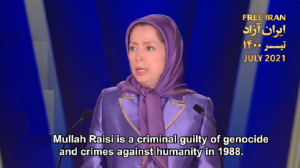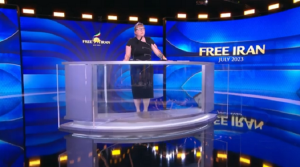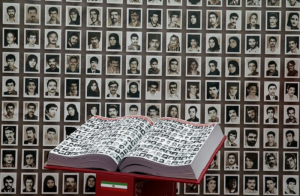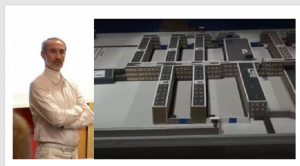
(Video) Iran: From Controversy to Accountability, Ebrahim Raisi Faces Global Demand for Justice

The (NCRI): From the very beginning, it was evident that the regime’s Leader, Ali Khamenei, who opted for a consolidated governance to withstand the continuous waves of popular uprisings since 2017, will fail to get back to the old days of indisputable reign.
After two years, the majority of the regime’s factions have now become vocal in rejecting Raisi’s administration and governance altogether.
PARIS, FRANCE, August 17, 2023/EINPresswire.com/ -- The National Council of Resistance of Iran-(NCRI) Foreign Affairs Committee in an article wrote that two years have passed since Ebrahim Raisi came to power. From the very beginning, it was evident that the regime’s Supreme Leader, Ali Khamenei, who opted for a consolidated governance to withstand the continuous waves of popular uprisings since 2017, will fail to get back to the old days of indisputable reign.
However, after two years, the majority of the regime’s factions have now become vocal in rejecting Raisi’s administration and governance altogether.
Citing the government’s achievements, state officials argue Raisi’s government is known for internet censorship, poverty, morality police, and stalling in foreign policy. They express their wish to receive no official documents from the cabinet members except for their formal resignation.
According to statistics and estimates published by state-affiliated media and former officials, Raisi’s two years as president have been marked by significant inflation (83%), a surge in liquidity (73%), a steep increase in the price of the dollar (95%), a soaring price of gold coins (162%), and an elevated price index (114%).
These alarming figures fuel daily cries of protest from various officials, either through the heavily controlled media or the halls of the tightly vetted parliament.
On August 5, Shargh newspaper delivered a noteworthy warning to Raisi, reminding him that a week earlier marked the anniversary of the execution of Sheikh Fazlollah Nouri, a cleric who was hanged by the Iranian people in 1909 for betraying the 1906 Constitutional Revolution movement.
Warning the entire ruling establishment in general and Raisi in particular, the author starts his writing by noting that the “event still serves as a relevant lesson after 114 years.”
But the calls for prosecuting Raisi do not only come from within Iran. The world’s public opinion and a wide range of former statesmen and jurists are joining the Iranian people in demanding justice and regime change.
At the Free Iran World Summit 2023, the 48th Vice President of the United States, Mr. Mike Pence, strongly asserted the need to “hold Raisi accountable for crimes against humanity and genocide.”
Mr. Janez Janša, former Prime Minister of Slovenia, highlighted the importance of holding those responsible for human rights violations by the Iranian regime to account, specifically reminding that “Ebrahim Raisi has been accused by Amnesty International of crimes against humanity for his role in [the 1988] massacre [of political prisoners].”Iran: Blood-soaked secrets: Why Iran’s 1988 prison massacres are ongoing crimes against humanity
Similarly, former Canadian Foreign Minister Mr. John Baird emphasized that the day of reckoning and accountability will come for the regime’s leaders, stating, “Let’s be very, very clear that these evil monsters will face justice, especially someone named Ebrahim Raisi.”
Other human rights experts, such as Dr. Melani O’Brien, President of the International Association of Genocide Scholars, and Mr. Gilbert Mitterrand, the President of the Danielle Mitterrand Foundation, also called for Raisi’s trial.
The call to end the regime’s impunity is causing tremors within the regime, evident in its issuance of arrest warrants for 104 members of the Iranian Resistance. As the regime’s suppressive forces experience a decline in morale, their leaders resort to phony initiatives to maintain a mirage of dominance.
Yet calls for the resignation of ministers and Raisi himself, or expressing concerns about the regime’s potential collapse, are being taken more seriously than the infrequent announcements by state media that the Mujahedin-e-Khalq Organization’s fate is sealed or its network inside Iran is dismantled.
During the Free Iran World Summit 2023, Mr. Kenneth Lewis, an attorney for the MEK, discussed the significance of a Stockholm court that recently sentenced Hamid Noury, a former prison guard in Iran’s Gohardasht prison, to 20 years in prison for his role in the 1988 massacre of thousands of political prisoners. Mr. Lewis said that the evidence presented at the court is putting Raisi, Khamenei, and other regime officials on trial.
Additionally, the Iranian National Council of Resistance’s office in Washington has published a book outlining “The Case to Hold Ebrahim Raisi to Account for Crimes Against Humanity.” Two years of crime, oppression, destruction, poverty, inflation, and the mass execution of the Iranian people will only be added as an appendix to this long indictment.
The clerical regime has completely closed down Gohardasht Prison in Karaj (Rajai Shahrprison), infamous for being the site of a massacre and crimes against humanity that occurred in 1988, along with other criminal executions starting in the early 1980s until today. To erase evidence of crimes in the 1988 massacre regime shuts down Gohardasht prison.
The Mizan News Agency, affiliated with the Judiciary, announced on August 5, “In line with the decisions made during the visit of Gholamhossein Mohseni Ejei, the head of the Judiciary, to Alborz Province on April 6, nearly half of the prisoners had been released by July 1, and all prisoners were transferred to Qezel-Hesar Prison by August 5 and the Gohardasht Prison was closed.”
Gohardasht Prison, located north of Karaj city, serves as the central prison for Alborz province. This prison’s name is deeply associated with the 1988 massacre of political prisoners, during which many detainees from Gohardasht Prison, even those whose sentences had legally ended, were retried and subsequently executed.
During the trial of Hamid Noury, a former Gohardasht prison guard, in the Stockholm District Court in Sweden, details of the crimes against humanity were revealed by survivors and witnesses of that horrible massacre. These shocking revelations were officially recorded as legal and judicial evidence.
A model of this prison was prepared by the People’s Mojahedin Organization of Iran (PMOI/MEK) and was presented in court while the trial was temporarily convened in Durres, Albania, in November 2022.
The replica clearly showcased the torture chambers, the “Death Corridor,” where prisoners were blindfolded and lined up to wait for their execution, and the execution hall, where the victims were hanged in groups.
On August 5, the regime’s judiciary also announced that in addition to the closure of Gohardasht, the central prisons in the cities of Mashhad, Zanjan, Tabriz, Kermanshah, Yazd, and Bijar in Kurdistan province will also be transferred outside the cities.
In recent years, the clerical regime in Iran has continued to take actions to eliminate evidence and sites of its atrocities, even going so far as to destroy the graves of its victims and construct buildings and highways on the unmarked mass graves where it secretly buried the political prisoners it executed. This reprehensible behavior is an obvious continuation of their crimes against humanity.
On August 3, a human rights organization reported that several political prisoners, including Saman Yasin, Saeed Masouri, Afshin Baymani, Hamzeh Savari-Lifti, Matlub Ahmadinejad, Loghman Aminpour, and Mohammad Shafi’i, had been transferred from Rajai Shahr Prison to Evin Prison.
The evacuation of Gohardasht Prison seems to have been conducted hastily, leaving the prisoners with no opportunity to gather their personal belongings and medications.
In recent years, Gohardasht Prison has come into focus again due to the transfer of political prisoners connected to the 2009 protests. For decades, the prison has hosted thousands of political prisoners and witnessed their torture and execution.
Human rights organizations, including Amnesty International, have consistently voiced concerns about the appalling conditions endured by detainees in Gohardasht Prison, particularly political prisoners and prisoners of conscience, and they have described it as an “inhumane” place.
Shahin Gobadi
NCRI
+33 6 61 65 32 31
email us here
Raisi stepped into Iran’s political scene after the 1979 revolution against the monarchy as a pro-Khomeini who would carry out his mentor’s every command.
EIN Presswire does not exercise editorial control over third-party content provided, uploaded, published, or distributed by users of EIN Presswire. We are a distributor, not a publisher, of 3rd party content. Such content may contain the views, opinions, statements, offers, and other material of the respective users, suppliers, participants, or authors.





